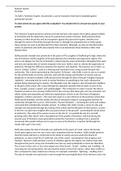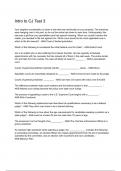Rukhsar Yazmin
Ms Patel
‘In Duffy’s Feminine Gospels, she presents a cast of characters that have triumphed against
patriarchal restrain’
To what extent do you agree with this evaluation? You should refer to at least two poems in your
answer.
The Feminine Gospels presents numerous female heroines who expose the truthful, gospel realities
of femininity and the oppressive nature of a patriarchal society. However, Duffy presents these
heroines to often break free and be triumphant against the patriarchal regime, whether it be
through the waves of feminism through the years or through the empowerment to freely speak,
these women are seen to be liberated from their restraints. Although, we also see the destructive
nature of patriarchy and Duffy also presents how it can deteriorate these heroines rather than
liberate them.
Duffy presents triumph over patriarchy in the poem of The Laughter of Stafford girl’s high, where the
rise of feminism and the laughter of the girls destroys the restrictive and oppressive regime. The
poem is an allegory for the rise of feminism, referencing the waves of feminism throughout the years
and how each generation of women empowers the next. Duffy is seen to criticise the oppression of
patriarchy through the difference between the teachers and students. The teachers are in italics, as
seen in ‘Callous! Callous!’, used as a silencing and restrictive force, trying to push the girls into
conformity. This is best represented by the teacher ‘Dr Bream’, who Duffy is seen to use as a symbol
for the anti-feminists of society, who fear and loath the change and freedom of women and are
desperate to conserve tradition. Duffy presents this through the idea of the girl’s laughter being an
‘epidemic’, conveying how for some in society feminism is something to fear and is destructive,
despite being empowering for women. The liberation over the regime is seen through the rebellions
of the girls at the school, this is seen through the repeated semantic field of water as seen in the
lines ‘a gargle, a plash, a splash’ and‘ gulping giggle’. The comparison to water conveys the idea of
freedom as water is free moving, furthermore it also conveys that these girls can’t be contained, not
within society and especially not within the expectations of them to be ‘the finest of England’s
daughters, mothers and wives’. The mock epic poem is a real reference to the grammar school that
Duffy herself attended, and she evokes the idea of education acting as a propaganda machine for
conformity through lines such as ‘John Dryden, Thomas Shadwell..’, conveying the sexist and tedious
curriculum that intentionally excludes women. To critique this, Duffy creates a sense of unity and
triumph over patriarchy through the closing of the school and the liberation of the teachers, as seen
in the line ‘you girls have laughed this once great school to the ground!’, presenting the break down
of patriarchy. The unity of the women is seen in the line of ‘ A snowball the size of a net ball…
growing under their hands’ and is metaphorical of the growth of feminism, and how during the
second wave of feminism many generations joined the movement, creating it into a powerful
movement that would continue on for years as seen in the final line ‘a teacher fell through the
clouds with a girl in her arms’.
Duffy also evokes the idea of triumph over patriarchy in the poem of ‘Loud’, where the female
heroin gains agency over her own voice and is empowered by her freedom. Duffy initially presents
that the female had been a conformist to the ideals of society and was under the thumb of
patriarchy, as seen in the line of ‘easily led, one of the crowd’, conveying her lack of agency and
freedom. However, Duffy presents a sense of rebellion against the regime, the violent verbs seen
throughout the poem convey her frustration but also are used symbolically to show her liberation.
This is seen in lines such as ‘her voice ripped out of her throat’, ‘shriek’, ‘wailing’ and ‘rumbling’, all
conveying her increasing power, but also that the power comes from nature, rather than conflict as
she’s compared to many natural occurrences, for example ‘avalanche’, ‘lightning’, ‘swelling rivers’.
The idea of triumph over patriarchy is seen through the transmogrification of the heroines voice into
Ms Patel
‘In Duffy’s Feminine Gospels, she presents a cast of characters that have triumphed against
patriarchal restrain’
To what extent do you agree with this evaluation? You should refer to at least two poems in your
answer.
The Feminine Gospels presents numerous female heroines who expose the truthful, gospel realities
of femininity and the oppressive nature of a patriarchal society. However, Duffy presents these
heroines to often break free and be triumphant against the patriarchal regime, whether it be
through the waves of feminism through the years or through the empowerment to freely speak,
these women are seen to be liberated from their restraints. Although, we also see the destructive
nature of patriarchy and Duffy also presents how it can deteriorate these heroines rather than
liberate them.
Duffy presents triumph over patriarchy in the poem of The Laughter of Stafford girl’s high, where the
rise of feminism and the laughter of the girls destroys the restrictive and oppressive regime. The
poem is an allegory for the rise of feminism, referencing the waves of feminism throughout the years
and how each generation of women empowers the next. Duffy is seen to criticise the oppression of
patriarchy through the difference between the teachers and students. The teachers are in italics, as
seen in ‘Callous! Callous!’, used as a silencing and restrictive force, trying to push the girls into
conformity. This is best represented by the teacher ‘Dr Bream’, who Duffy is seen to use as a symbol
for the anti-feminists of society, who fear and loath the change and freedom of women and are
desperate to conserve tradition. Duffy presents this through the idea of the girl’s laughter being an
‘epidemic’, conveying how for some in society feminism is something to fear and is destructive,
despite being empowering for women. The liberation over the regime is seen through the rebellions
of the girls at the school, this is seen through the repeated semantic field of water as seen in the
lines ‘a gargle, a plash, a splash’ and‘ gulping giggle’. The comparison to water conveys the idea of
freedom as water is free moving, furthermore it also conveys that these girls can’t be contained, not
within society and especially not within the expectations of them to be ‘the finest of England’s
daughters, mothers and wives’. The mock epic poem is a real reference to the grammar school that
Duffy herself attended, and she evokes the idea of education acting as a propaganda machine for
conformity through lines such as ‘John Dryden, Thomas Shadwell..’, conveying the sexist and tedious
curriculum that intentionally excludes women. To critique this, Duffy creates a sense of unity and
triumph over patriarchy through the closing of the school and the liberation of the teachers, as seen
in the line ‘you girls have laughed this once great school to the ground!’, presenting the break down
of patriarchy. The unity of the women is seen in the line of ‘ A snowball the size of a net ball…
growing under their hands’ and is metaphorical of the growth of feminism, and how during the
second wave of feminism many generations joined the movement, creating it into a powerful
movement that would continue on for years as seen in the final line ‘a teacher fell through the
clouds with a girl in her arms’.
Duffy also evokes the idea of triumph over patriarchy in the poem of ‘Loud’, where the female
heroin gains agency over her own voice and is empowered by her freedom. Duffy initially presents
that the female had been a conformist to the ideals of society and was under the thumb of
patriarchy, as seen in the line of ‘easily led, one of the crowd’, conveying her lack of agency and
freedom. However, Duffy presents a sense of rebellion against the regime, the violent verbs seen
throughout the poem convey her frustration but also are used symbolically to show her liberation.
This is seen in lines such as ‘her voice ripped out of her throat’, ‘shriek’, ‘wailing’ and ‘rumbling’, all
conveying her increasing power, but also that the power comes from nature, rather than conflict as
she’s compared to many natural occurrences, for example ‘avalanche’, ‘lightning’, ‘swelling rivers’.
The idea of triumph over patriarchy is seen through the transmogrification of the heroines voice into




